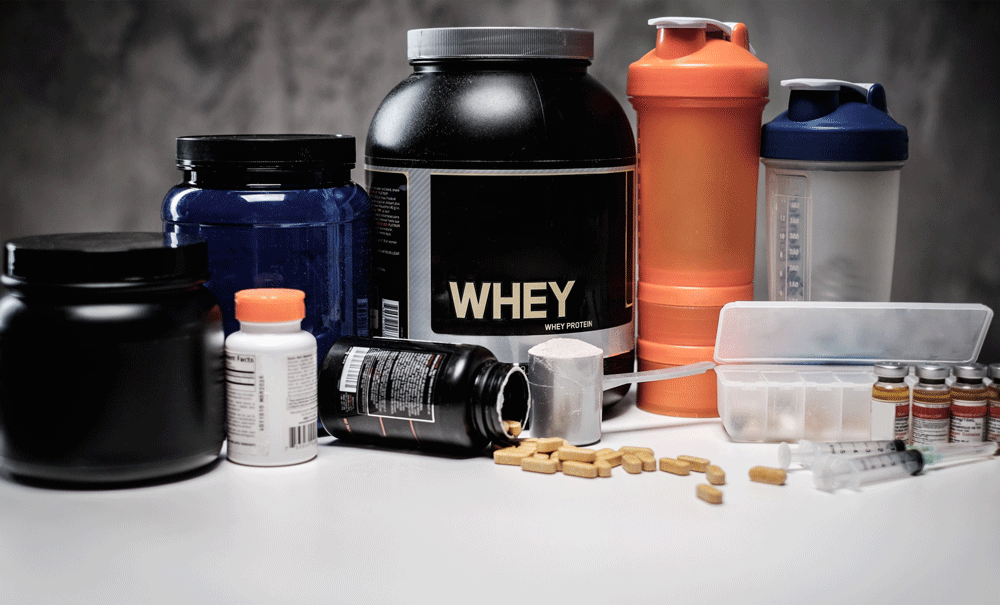Nutrition, Diet, Vitamins and Supplements for Rugby Players

Understanding what foods to eat before and after rugby practice or games and which supplements and vitamins to take can distinguish between a successful season and one full of injuries and underperformance and is important for maintaining a healthy immune system.
Pre-game Nutrition

Eating the right foods before a game or practice is essential for giving your body sufficient energy to perform at its peak. Carbohydrates provide a long-lasting energy source, so players should consume complex carbs like oatmeal, whole-grain bread, quinoa and brown rice several hours before the game. Fruits and vegetables are also an excellent pre-game snack, packed with vitamins, minerals and antioxidants to aid recovery after the game.
Post-game Nutrition

Replenishing your body’s energy stores is essential after a game or practice. Consuming complex carbs like oatmeal, whole grain bread and brown rice, and lean proteins like fish, chicken, and eggs are best. Fruits and vegetables are also an excellent way to get the vitamins and minerals your body needs for recovery.
Supplements for Rugby Players

Rugby is a gruelling and physically demanding sport that requires players to be in peak physical condition.
Taking the right supplements can help boost your body’s energy before a game or practice.
Creatine is a popular supplement rugby players use to improve strength and power. Other supplements that may benefit rugby players include whey protein, omega-3 fatty acids and BCAAs (branched-chain amino acids).
Read our list below for starters.
Protein Powder
Protein is essential for rugby players, as it helps with muscle building and recovery after workouts. Protein powder is an easy way to get in your daily protein intake without worrying about eating extra food. Look for a high-quality powder that contains whey, casein, and other forms of protein.
Creatine
Creatine is a natural supplement that helps to increase muscle strength and endurance in rugby players. It’s often used by serious athletes who want to gain an edge on the field. Take creatine after workouts, as it helps with post-workout recovery.
However, if taken incorrectly, creatine can have serious side effects. Here are some guidelines for taking creatine to gain the full benefits and avoid the potential side effects and any other relevant health risks associated with its use.
Some risks include increased dehydration, muscle cramping, stomach upset, and kidney damage. Additionally, taking larger doses of creatine may result in a false positive on a urine test, which could lead to disqualification from rugby competitions.
When selecting a creatine supplement, look for one with natural ingredients and no artificial additives or fillers. Also, it is best to consult your doctor before starting any new supplement, as some may interact with your medications.
Another essential factor to consider is how you take your creatine. Taking smaller doses over a more extended period rather than one large dose simultaneously is best.
Also, please do not take it with other stimulants or supplements that may increase the risk of dehydration. Lastly, staying hydrated while taking creatine and drinking plenty of water throughout the day is essential.
While some risks are associated with taking creatine, with proper use and understanding of the potential side effects, it can be a safe and effective supplement to help improve your performance in rugby. It is always important to consult your doctor before starting any new supplement, as they can provide valuable advice on how best to use it safely.
Caffeine
Rugby players often use caffeine to increase alertness and focus during training and matches. It can also help improve physical performance, as it helps to increase energy levels. Caffeine is best taken in the form of energy drinks or coffee. But while caffeine has some short-term effects that can benefit a rugby player, there are some risks associated with using this substance. This article will explore the potential risks of taking caffeine with rugby players and examine the possible solutions to minimize these risks.
RISKS: One of the primary risks of taking caffeine with rugby players is dehydration. Caffeine is a diuretic which increases urine production and can lead to excessive urination and dehydration. This is especially dangerous in hot climates and during intensive training sessions, as the body must stay hydrated to maintain performance. Additionally, increased blood pressure can occur due to caffeine, further contributing to dehydration. This could lead to fatigue and dizziness that may impair rugby players’ ability to perform at their best.
Another risk of taking caffeine is the potential for addiction. Caffeine is a stimulant that can cause an increase in energy levels and alertness, and some players may become dependent on it to perform. If caffeine is used in excess, it can cause physical and psychological dependence. In extreme cases, this can lead to withdrawal symptoms such as headaches, nausea, and fatigue if a player stops taking the substance abruptly.
Players should be mindful of their intake and not exceed recommended doses to minimise the risks associated with taking caffeine while playing rugby. Additionally, they should drink plenty of water before, during, and after a game or training session to stay hydrated. Lastly, players should be aware of the signs of caffeine addiction and take steps to reduce their intake if any signs are present.
Omega-3 Fatty Acids
Omega-3 fatty acids are essential for the overall health and well-being oF rugby players.
Branch Chain Amino Acids (BCAAs)
Amino acids are the building blocks of proteins, and they’re essential for muscle growth and repair. Most amino acid supplements contain all nine essential amino acids, which are crucial for optimal performance on the field. They can also help reduce fatigue after workouts, ensuring that players can perform at their peak for extended periods.
Vitamins for Rugby Players

Taking a daily multivitamin is one way to ensure you are getting the right vitamins and minerals that your body needs to perform at its best. Vitamins C and E are essential for rugby players, as they are essential for fighting off inflammation and fighting fatigue. Vitamins A and D are also crucial for maintaining a healthy immune system.
Finding the best vitamins for rugby players may seem daunting; read the summary below for starters.
- Vitamin A: This essential vitamin is important for maintaining healthy vision, protecting against infections and boosting immune function. It’s also crucial for the growth and repair of tissues throughout your body, including your bones and muscles. Foods rich in Vitamin A include carrots, spinach, sweet potatoes, dairy products, eggs, and liver.
- Vitamin B12: This vitamin helps form red blood cells, which is essential for rugby players who need to maintain high energy levels. It also helps with nerve and muscle functions, as well as metabolism. Vitamin B12 can be found in shellfish, fish, beef liver, and fortified cereals.
- Vitamin C: This vitamin is essential for collagen production, vital for healthy skin, bones, and muscles. It also helps repair tissues, such as torn muscles, throughout your body while aiding in iron absorption. Vitamin C can be found in fruits and vegetables such as citrus fruits, strawberries, broccoli, and tomatoes.
- Vitamin D: This vitamin is vital for strong bones and teeth, as it helps the body absorb calcium. It’s essential for rugby players who need a solid foundation to support their intense workout regimens. Vitamin D can be found in fatty fish, eggs, fortified milk and cereals.
- Vitamin E: This vitamin helps protect cells from damage caused by free radicals, which is important for athletes exposed to high physical activity levels. It also helps the body absorb fat-soluble vitamins like A, D, and K. Vitamin E can be found in almonds, sunflower seeds, spinach, and avocados.
Overall, the best vitamins for rugby players are Vitamins A, B12, C, D, and E. Be sure to incorporate these essential nutrients into your daily diet for optimal performance on and off the field.
Meal Planning for Rugby

Meal planning is an essential part of any rugby player’s diet. Planning your meals and snacks beforehand makes it easier to ensure you get the proper nutrients and avoid unhealthy foods. Having the right meal plan can make all the difference in helping you reach your goals.
Training Diet
When training for rugby, you must eat the right foods to fuel your muscles and speed up recovery.
Your diet should include plenty of lean proteins such as chicken, turkey, or fish and complex carbohydrates such as brown rice, whole grain pasta, and oats.
Eating plenty of fresh fruits and vegetables is also essential for getting the vitamins and minerals your body needs. Additionally, drink lots of water throughout the day to stay hydrated.
Meal Plans for Rugby Players
Here is an example meal plan for a rugby player that will give you an idea of what your diet should look like:
Breakfast
- Omelette with veggies and whole wheat toast
Lunch
- Chicken wrap with lettuce, tomatoes, and hummus
Snack
- Greek yoghurt with berries
Dinner
- Salmon with roasted vegetables
One-Day Meal Plan
Here is a sample one-day meal plan for rugby players to understand what they should eat in a day.
Breakfast
- Oatmeal with banana and almonds.
Lunch
- Chicken salad with spinach, tomatoes, and feta cheese
Snack
- Protein shake with almond milk and berries
Dinner
Grilled fish with sweet potato and steamed broccoli
Eating the right foods is essential for performing at your peak as a rugby player. By following this advice, you’ll be sure to get the most out of your training sessions and games.
Hydration for Rugby Players

Staying adequately hydrated is critical for rugby players, as dehydration can lead to fatigue and reduced performance. Drinking plenty of fluids before, during and after a game or practice is essential.
Sports drinks are also beneficial, as they contain electrolytes which help the body maintain proper hydration levels. Eating foods high in water content is another way to ensure your body stays hydrated. Fruits and vegetables like watermelon, cucumbers and celery are great water sources.
Rugby Nutrition Video
Recovery Tips for Rugby Players

Proper recovery is essential for rugby players, as it helps their bodies to repair and rebuild muscle tissue after strenuous activity. Eating a balanced diet of proteins and carbohydrates within 30 minutes of exercise is beneficial for recovery.
Taking an ice bath or using cold compression can help reduce inflammation while stretching exercises can improve flexibility and reduce the risk of injury. Massage therapy can also be beneficial for relieving muscle soreness and promoting relaxation.
Rugby Recovery Video
Sleep and Relaxation

Getting adequate sleep is essential for rugby players to perform at their peak, especially the night before a game. The National Sleep Foundation recommends adults get 7-9 hours of sleep per night. Lack of sleep can lead to decreased energy levels, poor concentration and delayed reaction times on the field. To ensure you get enough restful sleep, ensure your bedroom is dark and quiet, limit caffeine consumption and avoid using electronic devices before bed. Also, learn to use deep breathing techniques to help relax the night before a game.
In conclusion, eating healthy is the best way to ensure your body has the fuel to perform at its peak on and off the field. Eating lean proteins, complex carbohydrates, and plenty of fruits and vegetables is key. Supplements can provide an extra energy boost, while daily multivitamins can help ensure your body has the vitamins and minerals it needs to stay healthy and strong.
